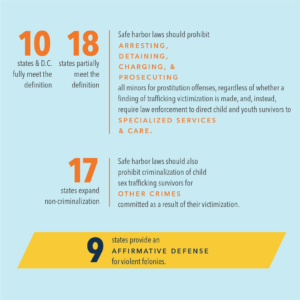Shared Hope International’s newly released Report Cards on Child & Youth Sex Trafficking reveals 37 states received failing grades for laws addressing child and youth sex trafficking, showing the nation’s continued challenge to provide comprehensive and accessible victim protections.
Watch the 2022 Report Cards on Child & Youth Sex Trafficking release video!
Shared Hope International’s 2022 Report Cards on Child & Youth Sex Trafficking shows almost half the country still allows children to be criminalized for their own victimization and a vast majority of states fail to provide funded, holistic services to child sex trafficking survivors. As the only U.S. NGO working in every state to advance legislative protections for child sex trafficking survivors, Shared Hope analyzes child and youth sex trafficking laws in all 50 states and the District of Columbia, using 40 policy goals to evaluate legal responses to child sex trafficking victims.
The report is used to press for a national standard of victim-centered justice, which can only be achieved if all states are actively working to develop and implement robust protections and just responses to children and youth who have experienced trafficking. Through the Report Cards, Shared Hope is pushing states to ensure all children have access to protective care and services that help survivors heal and rebuild their lives.
“We are thrilled to see many states introduce legislation this session addressing some of the largest gaps in appropriately responding to survivors of child sex trafficking: the development of statewide service responses, dedicated state funding, and provision of non-criminalization protections,” said former Congresswoman and Shared Hope Founder, Linda Smith. “However, a number of those states struggled to move related bills over the finish line, resulting in a preservation of status quo responses; today, too many children remain vulnerable to punishment for their own trafficking victimization and are unable to access critical services and care.”
In Shared Hope’s Report Cards on Child & Youth Sex Trafficking, states are graded across six policy issue areas, providing a consistent measure of state progress. States receive a letter grade based on their score, receiving an A, B, C, D, or F. In the 2022 report, zero states received an A. Tennessee has become the first, and only state, to receive a B, with an overall grade of 81.5. Three states have received a C, Florida, Texas, and California. Ten states received a D, and 37 states have received a failing grade of an F.
“It is encouraging to see states advancing reforms that reflect recommendations made in the 2021 Report Cards,” noted Christine Raino, Senior Director of Public Policy at Shared Hope. “In particular, it is exciting to award the first “B” grade only two years after introducing and utilizing a new framework aimed at prioritizing and advancing critical victim protections.”
In the next wave of legislative reform, Shared Hope is deepening its focus on state “safe harbor laws.” With more than a decade of commitment to improving safe harbor laws across the country, Shared Hope aims to set the precedent for safe harbor laws that ensure victims of child and youth sex trafficking are not involved in the juvenile or criminal justice system but are instead directed toward restorative and protective services.
Learn more about the importance of investing in community-based services by watching this video.
“It is my hope that stakeholders across the U.S. will utilize the upcoming legislative session to make significant headway on crafting and funding survivor-centered reforms, ensuring that states are equipped to provide all young people with the care, protections, and opportunities that positively impact their trajectory,” emphasized Raino. “Investment in communities, including community-based services, families, and children themselves, should be a priority for all states, paving the way for effective responses to and, most ideally, the prevention of child and youth sex trafficking.”
Expanding safe harbor laws to prohibit arresting, detaining, charging, and prosecuting all minors for prostitution offenses, while also requiring law enforcement to direct children and youth to specialized services and care, is necessary for implementing sustainable protections for vulnerable youth. Too often systems become the default for protecting children, removing children from the support networks that build their resilience to avoid being re-trafficked. Investing in services is investing in the eradication of child and youth sex trafficking in the United States; guaranteeing all children receive appropriate identification allowing for trauma-informed care and access to services.
Shared Hope’s Report Cards are now available. It is vital the Report Cards reach the hands of lawmakers across the nation and spur survivor-centered legislative reform. A campaign to contact legislators to push survivor-centered reform is now live here, allowing advocates to take action by emailing and tweeting their elected officials. Learn more about safe harbor here.
 Shared Hope has created useful tools that help educate advocates to understand their state laws meant to protect children who have been trafficked. Even if your state has a “safe harbor” law, examine the law to see if it meets the above named goals and if not, let your officials know that a bill name is not a victory.
Shared Hope has created useful tools that help educate advocates to understand their state laws meant to protect children who have been trafficked. Even if your state has a “safe harbor” law, examine the law to see if it meets the above named goals and if not, let your officials know that a bill name is not a victory. 





